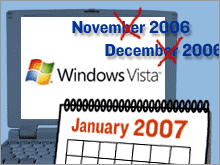|
A reality check for Vista A day late and a dollar short, the software giant's new Vista operating system won't have anyone standing on line to buy the first copy.
SAN FRANCISCO (Business 2.0 Magazine) -- Judging by the grief that Microsoft is getting over delays in the release of Windows Vista, and the buzz surrounding the price it plans to charge for the next generation operating system, you'd think we were all hankering to get our hands on this hot new piece of software. Don't believe the hype: There won't be lines around the block at midnight when Vista hits store shelves early next year, analysts say.
"I don't expect anyone's going to be camping out at Best Buy waiting for this product," says Citigroup equity research analyst Brent Thill. "I think the pace of adoption will be slower than the market expects." They can get it for you wholesale Microsoft (Charts) gets more than 80 percent of its $13 billion in annual Windows revenue from PC makers, who install the operating system on new PCs. The cost of Windows - estimated at around $70 - is included in the price we pay when we buy a new PC. The proportion of people who buy copies of Windows at retail to install on their PCs is vanishingly small. And the version of Windows that those retail customers have on their PC hardly figures into the equation. By and large, we buy a new PC when we need another one. "Consumers perceive what they have as good enough," says Joe Wilcox, an analyst at JupiterResearch. "A pattern we saw with Windows XP is that people would buy an XP machine and keep the older machine with the older operating system. They don't see the benefit of upgrading the older machine." Wilcox expects that Microsoft will see a spike in retail sales when Vista is released, but after a few months, people will revert to the pattern of acquiring a new OS by default, when they make a new PC purchase. And it's not like the retail effect really matters. Asked by analysts about the impact of further delays in the retail release of Vista, Microsoft executives recently said that sales might take a $200 million to $300 million hit if the release slipped past January. For a company that's expected to do $50 billion in revenues next year, that's a drop in the bucket. The modest expectations for Vista do give rise to a radical question: How many tens of thousands of engineers might Microsoft have fired, and how many billions of dollars might it have saved if it had just not bothered to develop Vista in the first place? Most of us would have kept buying Windows anyway. Al Gillen, research vice president for system software at IDC, points out that Microsoft's Windows sales have steadily increased, even though the company hasn't released a major new version in five years: "Have sales of PCs been falling off? The answer's no." Of course, Microsoft needs to keep up with the competition. Apple (Charts) CEO Steve Jobs loves to point out that his company has released five versions of Mac OS X in the time it has taken Microsoft to develop one. And the volunteer programmers behind Linux continually tweak and improve that open-source operating system. At the same time, though, Microsoft's share of the desktop OS market has remained at around 95 percent. Money well spent? With that kind of market share, Microsoft's at long last trying to leverage its monopoly power by raising prices. Of course, it's doing it in a subtle way. The Basic version of Vista is priced similarly to the last version of Windows XP at $199 for a retail license. But Microsoft is betting that PC makers will want to push higher-end machines that run Windows Vista Premium. Microsoft won't comment on the prices it charges PC makers for Windows, but analysts believe Microsoft will charge them about $40 more for that version of Vista as well. The end result: The average price of Windows will go up, even as most other components that go into a PC drop in price. Will Vista Premium be worth the extra cost? Essentially, the features you get with the more expensive version are better security, a prettier user interface, and the audio-video software formerly found in Microsoft's Media Center edition of Windows XP. That doesn't seem like a lot for five years' work, or for $40 extra. And here's the thing: Microsoft did a great job with Windows XP, especially after it fixed a lot of glaring security holes with its Service Pack 2 update. And most of our computing these days is done through a Web browser, not desktop applications. Vista won't run Web applications any better than XP. Of course, we'll find ourselves automatically upgrading to Vista whenever we buy a new PC - and we'll likely get pushed by salespeople to systems with Vista Premium, which comes complete with the premium price tag. As long as Microsoft's business of licensing Windows to PC makers keeps chugging along, its reliable Windows cash machine will keep churning out the dollars. So here's a modest proposal: Boycott Vista. Keep your old Windows XP PC around. Don't buy a new one. That's the only way we have to let Microsoft know Vista is an overhyped, late, and pointless update to XP - a perfectly fine operating system. |
Sponsors
|

